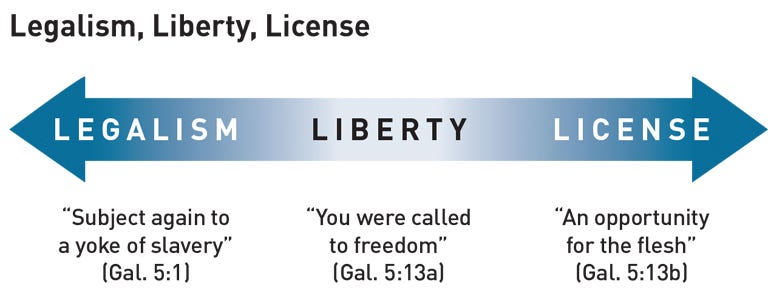An Exploration of Galatians: Love your Neighbor
Galatians 5:13-15; Mark 12:28-31 - We are not released from serving our neighbor when we are liberated by Christ.

”For you were called to freedom, brethren; only do not turn your freedom into an opportunity for the flesh, but through love serve one another. For the whole Law is fulfilled in one word, in the statement, “You shall love your neighbor as yourself.” But if you bite and devour one another, take care that you are not consumed by one another.“
Galatians 5:13-15 NASB1995
Paul probably took a breather or a walk around the block (or a prison cell) after wishing for the mutilation of the Judaizers before the next few verses were likely captured in this epistle. He is now back to calling the Galatians “Brethren” and telling them they were called to freedom. He has pounded the table many times in this epistle about legalism and the true liberty that is found in Christ. But now he transitions into the precautionary statements about not letting this freedom turn into opportunities for the flesh or licentiousness. Here’s a good graphical depiction of this delicate line that we are to walk (Precept Austin, credited to Chuck Swindoll)
Through love, we are to serve one another, following the second commandment that Jesus gave us in Mark 12 (among other places):
”One of the scribes came and heard them arguing, and recognizing that He had answered them well, asked Him, “What commandment is the foremost of all?” Jesus answered, “The foremost is, ‘Hear, O Israel! The Lord our God is one Lord; and you shall love the Lord your God with all your heart, and with all your soul, and with all your mind, and with all your strength.’ The second is this, ‘You shall love your neighbor as yourself.’ There is no other commandment greater than these.”“
Mark 12:28-31 NASB1995
Interestingly, our church recently changed their mission from the “Great Commission” found at the end of Matthew to go and baptize all nations to the first commandment noted above about loving the Lord our God with all of our heart, our soul, our mind and strength and to teach others to do the same. This change focuses on Him rather than on people first, although the other things will happen for people when He is the object of our love (“first love”).
I’ve been wanting to use this quote by C.S. Lewis for quite a while, so this is as good a time as any, because humans ARE rebels who need to lay down their arms. So (rhetorically speaking) you mean to tell me, Paul, that being freed from legalistic slavery does NOT give me the freedom to just sin and sin again, asking for forgiveness each time, like a mafioso going to confession after he committed another criminal act? No, in fact “serving” one another comes from the same Greek root word as slavery: δουλεύω or douleuo, meaning to “be a slave, serve, do service”. So we exchange one type of service or slavery (to the law) for another type (for our neighbor). Here’s what Enduring Word commentary has to say about this passage:
Only do not use liberty as an opportunity for the flesh: The great fear of the legalist is that liberty will be used as an opportunity for the flesh. The idea is that people will just go out and sin as they please, then say to a spineless God, “I’m sorry, please forgive me,” and then go on doing whatever they want again. Paul recognized the danger of this attitude, so he warned against it here.
First, Paul writes to brethren. These are those who are all sons of God through faith in Christ Jesus (Galatians 3:26). These are those who were baptized into Christ and have put on Christ (Galatians 3:27).
These ones have been called to liberty. As Paul put it earlier in the chapter, they have been made free by Jesus Christ, now they are called to stand fast therefore in the liberty by which Christ has made us free (Galatians 5:1). They have been set free; now the question is, “How will they use their liberty?”
Do not use liberty as an opportunity for the flesh: Clearly, we can choose to use liberty as an opportunity for the flesh. That option – that danger – is open to us. We can take the glorious freedom Jesus has given us, spin it, and use it as a way to please ourselves at the expense of others. Because the context focuses on the way we treat one another, Paul has in mind using our freedom in a way that tramples on the toes of others.
[Frederic] Rendall on opportunity: “This term was applied in military language to a base of operations, and generally to any starting-point for action.” We are tempted to use our liberty in Jesus as a “base of operations” for selfish sin.
It is easy to think liberty is “the right to sin,” or “the privilege to do whatever evil my heart wants to do.” Instead, this liberty is the Spirit-given desire and ability to do what we should do before God.
But through love serve one another: This is the antidote for using liberty as an occasion for the flesh. The flesh expects others to conform to us, and doesn’t care much about others. But when we through love serve one another, we conquer the flesh. It isn’t through an obsessive, contemplative attitude of navel-gazing that we overcome the flesh, but by getting out and serving others.
This is exactly the pattern set by Jesus. He had more liberty than anyone who ever walked this earth did. Yet He used His liberty to through love serve one another.
Finally, Paul ends this passage with another warning to the churches at Galatia that if they do bite and devour one another, to take care that they are not consumed. This admonition against “spiritual cannibalism” is actually quite profound, in this day and age of nasty comments on social media and escalating “tit for tat” arguments with complete strangers, not to mention strained family and friend relationships. Here’s a good example from Precept Austin quoting from Our Daily Bread with permission:
A number of years ago, I had a night out with my 4-year-old son. Halfway through our hamburgers, I detected rumblings in the booth behind me. The muffled anger in a man’s voice soon erupted in a snarl, “What did you say?” A woman shot back, “I said I’d never come crawling to you. I couldn’t get that low.” I cringed as he cursed at her and said, “I don’t know why I ever brought you to this restaurant tonight.” “I do,” she said. “You’ve got a guilty conscience!”
Ben was staring over my shoulder, so I asked him what he was thinking about. “Oh, I’m thinking about Jesus,” he said, “and how He died for our sins.”
Ben’s response left quite an impression on me. As the angry man and woman finished their meal by chewing up one another, I had to admit that I too knew about anger and a bad conscience. Then my own child reminded me that Christ came into this world to rescue us from our sin.
We have no excuse for falling back into the kind of cannibalism that took place in that restaurant. We have been forgiven and have received a spirit of love. And we have the example of Jesus. His ways are as practical and life-changing as we’re willing to let them be. By Mart DeHaan (Our Daily Bread, Copyright RBC Ministries, Grand Rapids, MI. — Reprinted by permission. All rights reserved)
I confess every week in my intercessory prayer to being hard-hearted, selfish, wrathful and impatient, among other sins. These are sins against others. I actually had a bunny trail “rant” written here about how appalling it is to see so much anti-semitism cropping up in this world. I decided to contemplate what I wrote and saved it (or a variation of it) for a future commentary, when we examine enmity and strife. Pray that my sins continue to be replaced with the fruits of the Spirit, which are also coming up soon in this exploration of Galatians.
My next devotional examines Galatians 5:16-18 - Walk by the Spirit.
Heaven on Wheels Daily Prayer -
Dear Lord - Please help us to know that being liberated in Christ does not mean that we are free to be licentious or to sin as we wish, but to love our neighbor as ourselves. In Jesus Name - Amen.
Scripture quotations taken from the (NASB®) New American Standard Bible®, Copyright © 1960, 1971, 1977, 1995 by The Lockman Foundation. Used by permission. All rights reserved. lockman.org.
The Blue Letter Bible was accessed on 12/17/2023 to find the definitions of “serving” from the lexicon.
The personal testimony from Bruce Hurt, creator of Precept Austin, can be found Here.
Commentary from Enduring Word by David Guzik is quoted with written permission.





Needed to hear this. Thank you, Barb.